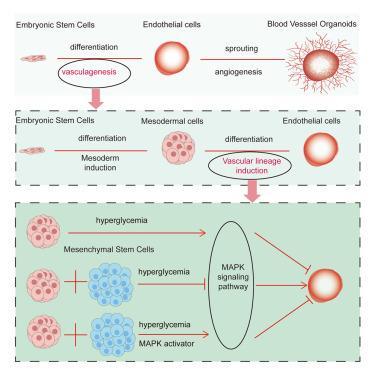HucMSCs can alleviate abnormal vasculogenesis induced by high glucose through the MAPK signaling pathway
IF 4.6
2区 综合性期刊
Q1 MULTIDISCIPLINARY SCIENCES
引用次数: 0
Abstract
Vascular complications caused by diabetes mellitus contribute a major threat to increased disability and mortality of diabetic patients, which are characterized by damaged endothelial cells and angiogenesis. Human umbilical cord-derived mesenchymal stem cells (hucMSCs) have been demonstrated to alleviate endothelial cell damage and improve angiogenesis. However, these investigations overlooked the pivotal role of vasculogenesis. In this study, we utilized blood vessel organoids (BVOs) to investigate the impact of high glucose on vasculogenesis and subsequent angiogenesis. We found that BVOs in the vascular lineage induction stage were more sensitive to high glucose and more susceptible to affect endothelial cell differentiation and function. Moreover, hucMSCs can alleviate the high glucose-induced inhibition of endothelial cell differentiation and dysfunction through MAPK signaling pathway downregulation, with the MAPK activator dimethyl fumarate further illustrating the results. Thereby, we demonstrated that high glucose can lead to abnormal vasculogenesis and impact subsequent angiogenesis, and hucMSCs can alleviate this effect.

HucMSCs 可通过 MAPK 信号通路缓解高糖诱导的异常血管生成
糖尿病引起的血管并发症是导致糖尿病患者残疾和死亡率增加的主要威胁,其特点是内皮细胞受损和血管生成。人类脐带间充质干细胞(hucMSCs)已被证明可减轻内皮细胞损伤并改善血管生成。然而,这些研究忽视了血管生成的关键作用。在本研究中,我们利用血管器官组织(BVOs)研究了高糖对血管生成和后续血管生成的影响。我们发现,处于血管系诱导阶段的 BVOs 对高糖更敏感,更容易影响内皮细胞的分化和功能。此外,hucMSCs 可通过下调 MAPK 信号通路缓解高糖诱导的内皮细胞分化抑制和功能障碍,MAPK 激活剂富马酸二甲酯进一步说明了这一结果。因此,我们证明了高血糖可导致血管生成异常并影响后续的血管生成,而 HucMSCs 可减轻这种影响。
本文章由计算机程序翻译,如有差异,请以英文原文为准。
求助全文
约1分钟内获得全文
求助全文
来源期刊

iScience
Multidisciplinary-Multidisciplinary
CiteScore
7.20
自引率
1.70%
发文量
1972
审稿时长
6 weeks
期刊介绍:
Science has many big remaining questions. To address them, we will need to work collaboratively and across disciplines. The goal of iScience is to help fuel that type of interdisciplinary thinking. iScience is a new open-access journal from Cell Press that provides a platform for original research in the life, physical, and earth sciences. The primary criterion for publication in iScience is a significant contribution to a relevant field combined with robust results and underlying methodology. The advances appearing in iScience include both fundamental and applied investigations across this interdisciplinary range of topic areas. To support transparency in scientific investigation, we are happy to consider replication studies and papers that describe negative results.
We know you want your work to be published quickly and to be widely visible within your community and beyond. With the strong international reputation of Cell Press behind it, publication in iScience will help your work garner the attention and recognition it merits. Like all Cell Press journals, iScience prioritizes rapid publication. Our editorial team pays special attention to high-quality author service and to efficient, clear-cut decisions based on the information available within the manuscript. iScience taps into the expertise across Cell Press journals and selected partners to inform our editorial decisions and help publish your science in a timely and seamless way.
 求助内容:
求助内容: 应助结果提醒方式:
应助结果提醒方式:


